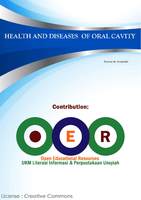Dublin Core
Title
Health And Diseases Of Oral Cavity
Subject
Health And Diseases Of Oral Cavity
Dental health
Dentistry
Dental Public Health
Description
Autoimmune bullous diseases are rare but represent a potentially devastating group of mucocutaneous diseases characterized by the presence of tissue-bound immunoreactants and circulating autoantibodies against various target antigens with disease specificity. Early signs
and symptoms of mucous membrane pemphigoid (MMP) or pemphigus vulgaris (PV) develop in the oral cavity in almost all patients, so the symptomatic patient will usually seek care from their general dentist or periodontist. The purpose of this study was to describe prominent clinical features that support a clinical diagnosis of autoimmune bullous diseases in
the oral cavity. This study was based on a retrospective review of 24 records that were classified as MMP (16) or PV (8). All 24 patients were referred by general dental
practitioners. The records included information on the referral letter, patient complaints, clinical sites, presence or absence of epithelial detachment, presence or absence of bulla formation on the oral mucosa and definitive diagnosis for the patient. The results indicate that
the epithelial desquamation of the gingiva is a prominent clinical feature that supports early
clinical diagnosis of autoimmune bullous diseases developed in the oral cavity. Asking for detailed symptoms will help confirm the clinical diagnosis since some patients are aware of the gingival desquamation. Dental healthcare providers should have greater knowledge of autoimmune bullous diseases, as careful interviewing and oral examinations will lead to a
diagnosis and treatment for these diseases in the early stages. This early diagnosis and subsequent early treatment could significantly improve the clinical course of the diseases.
and symptoms of mucous membrane pemphigoid (MMP) or pemphigus vulgaris (PV) develop in the oral cavity in almost all patients, so the symptomatic patient will usually seek care from their general dentist or periodontist. The purpose of this study was to describe prominent clinical features that support a clinical diagnosis of autoimmune bullous diseases in
the oral cavity. This study was based on a retrospective review of 24 records that were classified as MMP (16) or PV (8). All 24 patients were referred by general dental
practitioners. The records included information on the referral letter, patient complaints, clinical sites, presence or absence of epithelial detachment, presence or absence of bulla formation on the oral mucosa and definitive diagnosis for the patient. The results indicate that
the epithelial desquamation of the gingiva is a prominent clinical feature that supports early
clinical diagnosis of autoimmune bullous diseases developed in the oral cavity. Asking for detailed symptoms will help confirm the clinical diagnosis since some patients are aware of the gingival desquamation. Dental healthcare providers should have greater knowledge of autoimmune bullous diseases, as careful interviewing and oral examinations will lead to a
diagnosis and treatment for these diseases in the early stages. This early diagnosis and subsequent early treatment could significantly improve the clinical course of the diseases.
Creator
Tomasz M. Karpiński
Source
http://books.tmkarpinski.com/10-Karpinski-2017.pdf
Publisher
JB Books
Date
2017
Contributor
Dwi Prihastuti
Rights
Creative Commons
Format
pdf
Language
English
Type
Textbooks
Text Item Type Metadata
Text
Textbooks
Original Format
pdf

